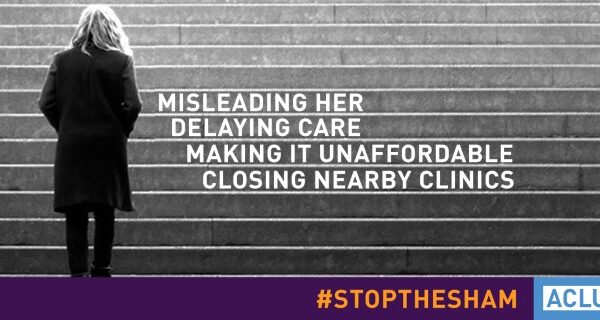In each of my roles — a mother, a daughter, a former State Senator, a lawyer, and the current Executive Director of the ACLU of Nebraska — the belief that personal decisions about family size and quality of life should not be decided by the government has remained constant.
Forty-three years after Roe v. Wade legalized a woman’s right to abortion, the Supreme Court is again considering another abortion case — one that will have serious implications for what Roe actually guaranteed.
The case, Whole Woman’s Health v. Hellerstedt, is sure to be a watershed moment for abortion rights. The court will consider just how far states can go in blocking the path of a woman who has decided to have an abortion.
Ever since the Roe decision, anti-abortion activists have attempted to roll back women’s right to have an abortion. Over the past five years, they have been relentless.
Consider this: In the five years starting in 2011, anti-abortion opponents passed as many restrictions on abortion as in the previous 15 years combined. In 2015 alone, 396 provisions to restrict abortion were introduced — 57 of those were enacted.
Here are just a few examples of what these unnecessary and unfortunate government mandates include: forced speech requirements that doctors provide medically inaccurate information to their patients, laws that force a woman to make medically unnecessary extra trips to the clinic, insulting laws that force a woman to have an ultrasound before she can have an abortion, and laws that prohibit her from using her own private insurance to pay for her own medical needs.
Many of the abortion restrictions were introduced under the guise of protecting women’s health. TRAP laws, or targeted regulation of abortion providers, require doctors to have admitting privileges or clinics to meet standards of surgical ambulatory centers.
While these requirements may sound reasonable on their face, the medical experts, including the American Congress of Obstetricians and Gynecologists, say that they don’t make women any safer. In fact, because these standards are often impossible for doctors and clinics to comply with, the medical experts say that they put women at risk by shutting down clinics where they can get a safe and legal abortion.
For example, for a clinic to become an ambulatory surgical center it needs to be retrofitted as a mini-hospital. Compliance can cost millions of dollars. Since most clinics cannot afford the costs they are forced to shut down.
Likewise, requiring doctors who provide abortions to have admitting privileges at local hospitals results in closed clinics — not safer clinics. To get admitting privileges at hospitals, doctors often must admit a certain number of patients. But abortion is an incredibly safe procedure, less than 0.3 percent of abortion patients experience a serious complication. At that rate, doctors who provide abortion won’t ever meet the hospital’s quotas.
These rights are ever increasingly under attack in Nebraska. In 2000 Nebraska was not classified as a state hostile to abortion rights. Just a decade later in 2010 Nebraska was classified as hostile to abortion rights. Today Nebraska is now one of only 18 states considered extremely hostile to abortion rights. Currently 97% of Nebraska counties do not have an abortion clinic and 41% of Nebraska women live in the counties without an abortion clinic. Each year about 2,000 Nebraska women seek access to safe and legal abortion services due to medical, personal, and economic reasons. A woman in one of these counties, in addition to being subjected to arbitrary waiting periods and coercive counseling, many incur considerable additional costs related to lengthy travel and time off of work as the nearest abortion provider is several hours away and restrictions have been imposed that prohibit safe and proven telemedicine methods that could better serve rural residents.
In January 2015, state level legislation was introduced to end ALL access to safe and legal abortion in Nebraska and three other bills have been introduced that seek to impose even more unnecessary restrictions on doctors and patients who are exercising their right to pursue health care options they feel are medically appropriate and right for them and their families.
On this anniversary we not only reflect but we also renew our commitment to speak out and let our voices be heard. We call on legislators to leave these decisions where they belong: with a woman, her family, and her doctor. We remind all Nebraskans that we can and should do more to work together to improve education and prevention efforts that benefit all Nebraskans. We pledge to keep fighting in the courts, at the legislature, and through public education efforts to ensure the rights of all Nebraskans are respected by all Nebraskans.



